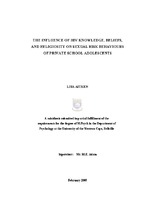The influence of HIV knowledge, beliefs, and religiosity on sexual risk behaviours of private school adolescents
Abstract
Despite the rapid increase of HIV infections among South Africa’s adolescent
population, many teenagers continue to pa ake in sexually risky behaviours. The
between these variables. Placed within a quantitative framework, 123 “socioeconomically
advantaged” Grade 11 and 12 learners (ages 16 to 19) from two
randomly selected private schools in Cape Town completed four self-administered
has been identified for HIV prevention programmes to be specifically designed to
meet the needs of the target audience. It is, therefore, hoped that the results of this
study can contribute positively towards the development of effective, target-
rt
theory of planned action accounts for the low correlation between information and behaviour by identifying the strong influence of behavioural intentions, attitudes towards the behaviour, subjective norms, and perceived control in determining behaviour change. This research project primarily aims to assess the levels of sexual risk-taking behaviours, HIV-related knowledge, beliefs, and religiosity of private school adolescents, as well as to determine the nature of the relationships questionnaires. The HIV-KQ-18 questionnaire measured HIV-related knowledge, the Sexual History Questionnaire (SHQ) assessed sexual risk behaviour, the Sexual Risk Behavior Beliefs and Self-Efficacy Scales (SRBBS) measured the effect of attitudes, norms, self-efficacy and barriers to condoms on sexual risk-taking and protective behaviour, and the Santa Clara Strength of Religious Faith Questionnaire (SCSORF) assessed strength of religious beliefs. The data were analysed using descriptive statistics, correlations and t-tests. Results showed that respondents engaged in lower levels of sexual risk-taking behaviour than those reported in South African literature from differing populations. A high level of HIV knowledge and reasonably high acceptance of safe-sex behaviours among respondents was also noted. No other significant differences were identified between this study and recent South African literature. The results of this study lend support to the relevance of the theory of planned behaviour. A strong need specific HIV-prevention programmes.

